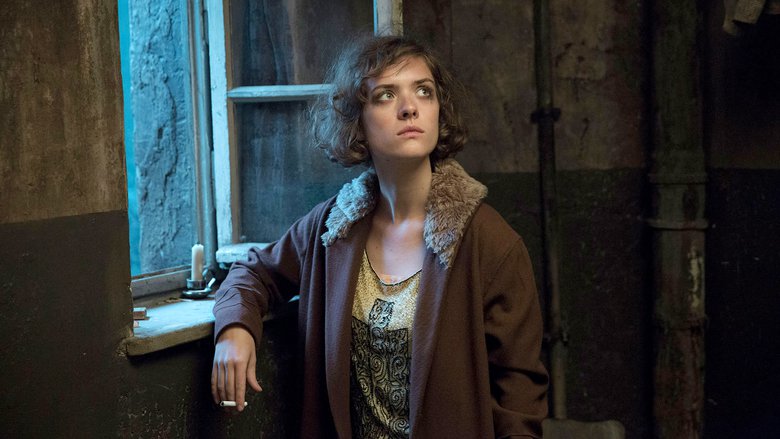Babylon Berlin
"Dad says the anticipation of having something is often more fun than actually having it. I think he's crazy. I hate waiting for things. I like to have everything immediately. I can't think of anything I'd rather anticipate than have right away. Can you?" "Death comes to mind."
"I don't know why I bother trying to have a little conversation with you when you're always so morbid."
–Calvin and Hobbes by Bill Watterson
I'm a sucker for political thrillers– Tinker, Tailor, Soldier, Spy; L'Affaire Farewell; Z; the collected works of Alfred Hitchcock. Movies like this work by building a sense of... anticipation. The most important tool these stories have is to tell the audience something bad is going to happen... and then make them wait for it.
Babylon Berlin, now streaming on Netflix, twists its cranks and turns its gears in heart-pounding set pieces that find our heroes breaking into a vicious gangster's safe, hanging out of a malfunctioning airplane, and racing to return home before a bomb blows up.
 But beyond the machinations of the plot, the show's premise is about suspense. We are in Weimar Germany, in the year 1929. In four years, Germany will be in the grip of an authoritarian dictatorship. In ten years, it will be at war again. Like the ancient capital of Babylon, Berlin is on borrowed time.
But beyond the machinations of the plot, the show's premise is about suspense. We are in Weimar Germany, in the year 1929. In four years, Germany will be in the grip of an authoritarian dictatorship. In ten years, it will be at war again. Like the ancient capital of Babylon, Berlin is on borrowed time.
We all know what happens next. The interesting thing is how we get there. We will wait through most of the series before we see a single Nazi uniform (trust me, it's worth the wait.) Until then, life goes on.
Berlin is a boiling stew of civil unrest. Political groups of all stripes vie for influence, and the metropolitan police must maintain order– often with violent tactics, and a couple cover-ups as necessary to make sure the gruesome stuff doesn't hit the papers. Communists stage a demonstration on the First of May, and are met with batons and machine guns.
World War I looms over everything that happens in this show. Only a decade out from the largest armed conflict in human history[ref]Just you wait, just you wait...[/ref], almost every male character is a veteran of some kind. Several bear physical injuries that are unremarked upon. Doctors struggle to treat others battling "shell shock," or PTSD.
A group of veterans drink a toast to the friends they lost in their unit, solemnly claiming that the German army was never defeated on the field. They want another chance to prove themselves– and they'll get one, very soon.
The show is based on a series of crime novels by Volker Kutscher. Tom Tykwer, Achim von
Borries, and Henk Handloegten shared writing and directing duties. Tykwer is the best known in the U.S., having worked on Sense8, and directed films such as Cloud Atlas, and Run Lola Run, another thriller built on a tightly suspenseful premise.[ref] Lola must save her boyfriend, Manni, by somehow pulling together 100,000 Deutsche Marks in 20 minutes.[/ref]
In a sprawling cast, our two main characters are Gereon Rath (Volker Bruch), a vice cop from Cologne in Berlin on a special assignment, and Charlotte Ritter (Liv Lisa Fries), a typist at the police station who lives in a squalid apartment and dreams of bigger things.
Their investigation finds them chasing down mob bosses in the city underworld, and searching a train smuggling gold and weapons-grade poison gas from the Soviet Union.
Yes– this show features, in its opening scenes, a steam locomotive and tanker cars being hijacked by Trotskyist expats. The train is nothing: there are period costumes on hundreds of extras, packed into rowdy night clubs and dozens of sets. After all that, period-appropriate planes, trains, and automobiles are the icing on the cake.
The world looks gorgeous– the cinematography is reminiscent of crime films from the 1940s, like The Third Man, which also loved giant silhouettes on brick wall. It also comes from M, a film made in Germany in 1931, and which proved highly influential to the genre we'd call film noir during and after the war.
We get a taste of the lively cultural center that was 1920s Berlin as well– characters go to the movies, and visit nightclubs to hear jazz music (Cabaret fans, eat your heart out). Sex and drugs are treated liberally– the government has to keep track of syphilis cases, Charlotte works as a prostitute in one club to help make ends meet, and Gereon breaks open vials of morphine to cope with losing his brother during The Great War.
Speaking of Gereon– gentlemen, do you see that hat he's wearing? That is a fedora. You see how gritty and cool and damaged he looks? It's not because of the hat. The hat only works because of everything else he's wearing. So unless you want to wear a three-piece wool suit and a trench coat in June, don't wear that hat.
Did I mention it's the most expensive TV show ever produced in Europe? I feel like Babylon Berlin uses its budget more effectively than something like Game of Thrones, which seems to save its budget for a few key episodes, mostly involving dragons. It doesn't cost much to create a suspenseful scene– it could be as simple as Rath crossing a narrow plank between two rooftops, or a housemaid sneaking her boyfriend into her employer's study. The expense goes into the world building, which is pervasive and enveloping.
And in order for the suspense to work, the world building must be pervasive and enveloping. If it isn't, your concentration is removed from the story, and you start asking questions. Annoying questions. Questions the filmmakers would rather you didn't ask. Like, "Why doesn't she just tell him, already?" or "How did he get in there without anyone noticing?"
The neat thing is that even if you know the story, even if you know our heroes aren't going to get caught, you'll still feel that twinge of anxiety when they're in danger. It'll work on the second, or twenty-second viewing. And I think Babylon Berlin will stand up to multiple binge watches.
The specter of death hangs over everything from this time. The deaths that came with The War to End All Wars, and the deaths that will come in the next one. I suppose experiencing a suspenseful story is about confronting death itself– the effect works best when the characters are in mortal danger.
Will Charlotte and Gereon survive the coming war? I don't know. First they have to survive the next ten years of political upheaval.



